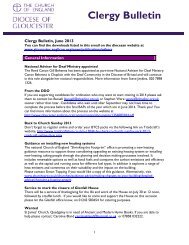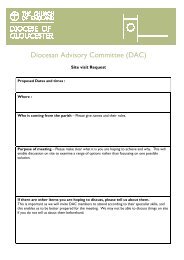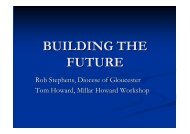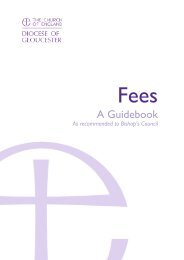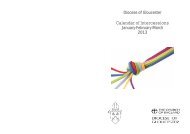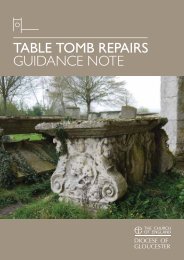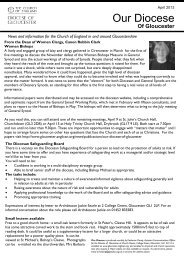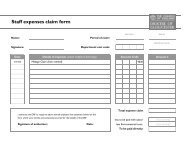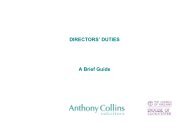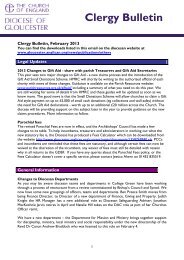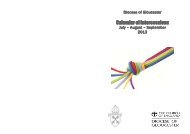Download the Revised RE Syllabus 2011 - Diocese of Gloucester
Download the Revised RE Syllabus 2011 - Diocese of Gloucester
Download the Revised RE Syllabus 2011 - Diocese of Gloucester
You also want an ePaper? Increase the reach of your titles
YUMPU automatically turns print PDFs into web optimized ePapers that Google loves.
Religious Education in <strong>Gloucester</strong>shire - Agreed <strong>Syllabus</strong> <strong>2011</strong>-2016<br />
The contribution <strong>of</strong> religious education<br />
to <strong>the</strong> wider curriculum and pupil<br />
development<br />
<strong>RE</strong> plays a significant role in<br />
<strong>the</strong> personal development <strong>of</strong><br />
children and young people<br />
At its heart is <strong>the</strong> intention to<br />
enable children and young people<br />
to become “religiously educated”<br />
in order to face <strong>the</strong> demands <strong>of</strong><br />
<strong>the</strong> contemporary world.<br />
What might a “religiously<br />
educated person” be Some<br />
possible responses include<br />
someone who...<br />
• has a depth <strong>of</strong> understanding<br />
and insight into religion and<br />
belief, and <strong>the</strong>ir impact in <strong>the</strong><br />
lives <strong>of</strong> believers and society,<br />
including <strong>the</strong> implications for<br />
<strong>the</strong>ir own lives;<br />
• is confident and thoughtful<br />
about, and able to express, <strong>the</strong>ir<br />
own beliefs;<br />
• acts in accordance with <strong>the</strong>ir<br />
beliefs;<br />
• is interested in, and respectful<br />
towards, <strong>the</strong> beliefs <strong>of</strong> o<strong>the</strong>rs;<br />
• is interested in building up <strong>the</strong>ir<br />
understanding <strong>of</strong> different<br />
religions and beliefs;<br />
• is able to think for <strong>the</strong>mselves<br />
and recognise where o<strong>the</strong>rs<br />
may be trying to influence <strong>the</strong>m;<br />
• continues to explore <strong>the</strong><br />
questions <strong>of</strong> meaning that life<br />
throws up in light <strong>of</strong> <strong>the</strong> insights<br />
<strong>of</strong> faith.<br />
Given <strong>the</strong> opportunities for<br />
encountering people <strong>of</strong> different<br />
beliefs and lifestyles, <strong>RE</strong> also has<br />
a key role to play in fostering social<br />
cohesion. As well as being<br />
“religiously educated”, <strong>RE</strong> helps<br />
pupils to become “skilled cultural<br />
navigators”, able to handle <strong>the</strong><br />
differences <strong>of</strong> faith and belief around<br />
<strong>the</strong>m, as well as establish <strong>the</strong>ir own<br />
sense <strong>of</strong> identity and belonging.<br />
For ideas and examples <strong>of</strong> how <strong>RE</strong><br />
can promote social cohesion, see<br />
Appendix E on Schoolsnet.<br />
At <strong>the</strong> root <strong>of</strong> <strong>RE</strong>’s significant<br />
contribution to pupil development,<br />
are <strong>the</strong> specific skills and attitudes<br />
that are at <strong>the</strong> heart <strong>of</strong> <strong>the</strong> process<br />
<strong>of</strong> teaching and learning in this<br />
subject.<br />
In <strong>the</strong> process <strong>of</strong> exploring religion<br />
and belief, <strong>RE</strong> seeks to develop <strong>the</strong><br />
ability <strong>of</strong> pupils to:<br />
• Investigate<br />
• Interpret<br />
• Reflect<br />
• Evaluate<br />
• Empathise<br />
• Analyse<br />
• Syn<strong>the</strong>sise<br />
• Apply<br />
• Express<br />
• Discern<br />
<strong>RE</strong> encourages <strong>the</strong> development <strong>of</strong>:<br />
• Self-awareness<br />
• Respect for all<br />
• Open-mindedness<br />
• Appreciation and wonder<br />
For examples <strong>of</strong> how to develop<br />
<strong>the</strong>se skills and attitudes in <strong>RE</strong>, see<br />
Appendix A and B on Schoolsnet.<br />
<strong>RE</strong> plays an important part in<br />
promoting <strong>the</strong> spiritual, moral,<br />
social and cultural development<br />
<strong>of</strong> pupils, making a unique<br />
contribution to <strong>the</strong>ir spiritual<br />
development in particular.<br />
For a more detailed explanation <strong>of</strong><br />
<strong>the</strong>se terms, toge<strong>the</strong>r with ideas and<br />
examples about how <strong>RE</strong> gives<br />
opportunities for <strong>the</strong>ir development,<br />
see <strong>Syllabus</strong> page 20.<br />
Well-being can be interpreted in<br />
terms <strong>of</strong> healthy choices and<br />
lifestyles. However, <strong>RE</strong> opens <strong>the</strong><br />
possibility <strong>of</strong> exploring a deeper<br />
understanding <strong>of</strong> well-being,<br />
incorporating spiritual health, a<br />
fascination with <strong>the</strong> world and our<br />
place in it, and a resilience to <strong>the</strong><br />
hardships that life <strong>of</strong>ten brings.<br />
<strong>RE</strong>’s unique contribution comes from<br />
<strong>the</strong> rich resources <strong>of</strong> <strong>the</strong> world<br />
religions, whose leaders and<br />
followers have frequently responded<br />
to life and <strong>the</strong> world with wisdom<br />
and insight. Combined with <strong>the</strong><br />
insights from those who reject<br />
religious belief, this <strong>of</strong>fers students<br />
valuable perspectives to explore and<br />
evaluate when examining <strong>the</strong>ir own<br />
responses to life.<br />
For more on <strong>RE</strong>’s contribution to<br />
pupil well-being, see Appendix D on<br />
Schoolsnet.<br />
5



